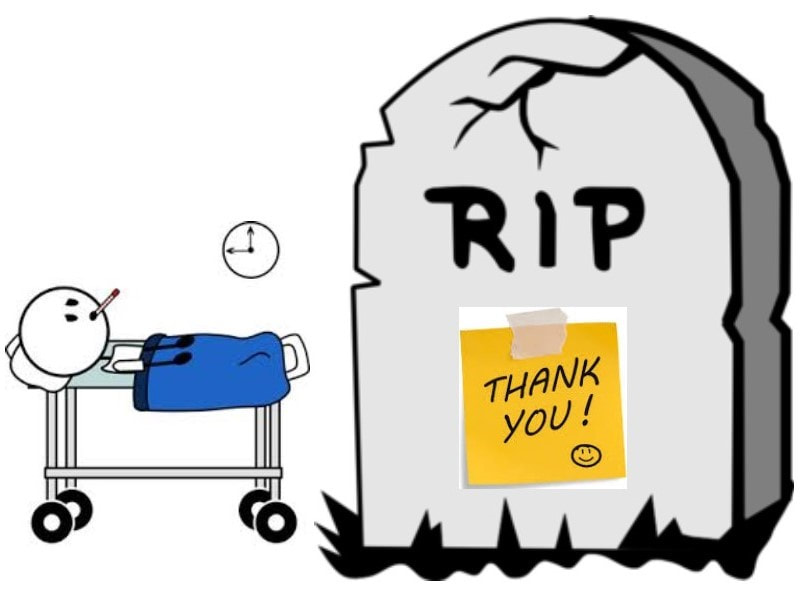 Here’s a way to increase your Joy@Work AND in your life generally and all you have to do is say two words! Worthwhile investment I think. And what are those words? Have you guessed? No! Not ‘You’re fired’, or ‘Go away!’ but ‘Thank you! Here is a little 'Thank You' quiz. Think of your answers as Yes, No or Seldom -
I can remember that as soon as I could write, my very first letters were to say thank you for some gift I had received. It was compulsory! Recently, on both sides of the Atlantic I am hearing those two special ‘thank you’ words less and less. It seems that increasingly people do not express any appreciation for a gift or thoughtful act.Such a small act means so very much. It caused me to be deeply concerned about the health of ‘thank you’, I fear it may be critically ill! Before it dies, let’s look at some ways to breathe new life into it and you too! Let’s explore the concept and ways of saying and doing ‘thank you’. What does it mean and where did it come from? Thank you means a grateful feeling or acknowledgment of a benefit, favour, or the like, expressed by words or otherwise. ‘Thanks’ is used as an informal expression of gratitude, appreciation, or acknowledgment. The history of the word thank can be traced back to about 9000 years from the Old English word "pancian" = meaning "to give thanks", which in turn derives from the Proto-German term "thankojan", which also spawned the Middle German term "danken" = meaning "to thank". Another history says that it is related to the Old English noun þanc, þonc, originally "thought," but by c.1000 "good thoughts, gratitude." It is a term of respect and politeness for one human to another. It is also important to realise that some cultures do not have the habit of saying ‘thank you’ they are not being rude as we may consider. The Nepalese show the level of respect for a person by how they are addressed and the thank you is incorporated. In East Africa, a nod of the head is far more appropriate and in Thailand there are many levels of thanks, from ‘wai’ or hands in prayer position for small thanks to saying ‘Thank you’ which would be saved for ‘Here is a large bar of gold!’ Quite fascinating how something we take so for granted has a long and rich history. Responses to the thank you And if someone does say thank you to you, how do you respond? ☹ Do you brush it off, ‘Oh it really wasn’t anything!’ ‘What, this old outfit?’ These responses knock the air right out of the thankers message and positive thoughts. It is a thank you flattener. What does the thanker say to that? And they may not feel disposed to express their thanks again in the future. ☹ Do you look away and pretend you didn’t hear because it makes you feel uncomfortable? Do you feel that deep down you do not deserve any thanks? Do you not know how to respond? (Read on, you soon will!) 😊 Do you light up and respond with appreciation for their thanks? ‘That is so very sweet of you’, ‘I really appreciate your noticing’. How not to give thanks It seems that everything can be used for good and bad, even a thank you! There is the sarcastic ‘thank you’ really meaning the opposite and it cuts sharply. Then there is saying the thank you, you think the other person should have said for them in a passive, aggressive manner, for example as the door closes and you are trying to get through on crutches. ☹ The retaliation actions If you are feeling hurt because you gave a gift or went out of your way to do something for someone and then you did not receive a thank you, not just once but several times, it can encourage the feeling of not wanting to give to them any more. Now is a chance to stop and think why did you give / do in the first place? Was it because you felt you had to, or because you wanted to? If you felt you had to, in some way that may be conveyed to the other person and so you may indeed stop doing it. If you did it because you wanted to and they did not say thanks, then remind yourself that you did it because it pleased yourself and be happy with that. Finally, there is one more retaliation action, it is the thought that you must give a gift of equal or greater value back to the original giver as a thank you. Here some consideration is important as that can be a cultural trait, so depending on the level of friendship and how often that might happen, you may wish to gently explain that for us a thank you is wonderfully sufficient! Thank you etiquette As thank you is a part of ‘good manners’, consideration and positive relationship building, there is a customary code of polite behaviour. Here are some things to consider: How to receive a thank you Remember that thank you, whether for a big or small act of consideration is given as a free gift of acknowledgment and appreciation, it is consequently only polite to recognise it. The recognition can be a nod of the head, preferably while looking in the person’s eyes; might be a ‘You’re welcome’ or ‘My pleasure’ for a larger thank you. Depending on your relationship, you could bow or curtsey for fun, give the thanker a hug or a chatty response to show how you appreciate their noticing. If you receive a written thank you, do you need to write a thank you for that?! No! Otherwise it would never end – however, the next time you see the person, you may say that their card / email / note meant a lot to you. How to give thanks The first step is to be aware – aware of what others might be doing for you, holding a door open; making a cup of coffee for you; staying behind to wait for you, it might be a relatively small thing, or something that is done very often, nevertheless, it is still a consideration that the other person had for you and as such, deserved some recognition in the form of a thank you. So, say it! A smile, a thanks or thank you, or if you know them well and it is appropriate, a hug or a kiss. I remember my Mother saying thank you to me every time I drove her to the shops, at that time, I didn’t feel it needed a thank you, I did it because I wanted to do it for her, now I understand and find myself doing the same if I am driven somewhere. Keep constantly tuned as to who might be doing some small or large act of kindness for you. It is often those closest to you, who everyday give a sign of their love and respect for you by, in some way putting you first. And although the act might be repeated often, for example my husband usually makes me a cup of coffee in the morning, it is still most, actually even MORE, important to appreciate it fresh each day and say so. If the act was done away from the person, they sent you a gift or a card, another reason for saying thank you is to let them know that you did receive it, otherwise they will be wondering. Keep a thanks opportunity watchful eye and share one whenever you discover the opportunity. The power of a targeted thank you It may well be that someone at your work place, either ‘above’ or ‘below’ you is not quite self-confident and your taking the time to specifically notice and provide detailed and target thanks to them, can make all the difference in the world. Be very precise, really notice and comment on their efforts, even ask them to tell their story, it may have involved even more that you realised. Then lavish the thanks, here, some form of a written note that they can keep is even more beneficial. It just remains for me to say thank you to you for reading my Joy@Work series, please contact me if there are any specific issues you would like me to address. The Resilient Warrior Woman, Vanda
0 Comments
Leave a Reply. |
The Holistic Life CoachHolistic & Natural Solutions for Health and Wellbeing Categories
All
Archives
March 2018
|
COOKIE POLICYWe use cookies on this site to help us improve your experience. If you wish to understand fully how we use these, click through for our 'cookie policy'.
PRIVACY POLICY |
disclaimerAll material on this website is provided for your information only and may not be construed as medical advice or instruction. |
Contact UsSubscribeJoin our mailing list today!
|



 RSS Feed
RSS Feed